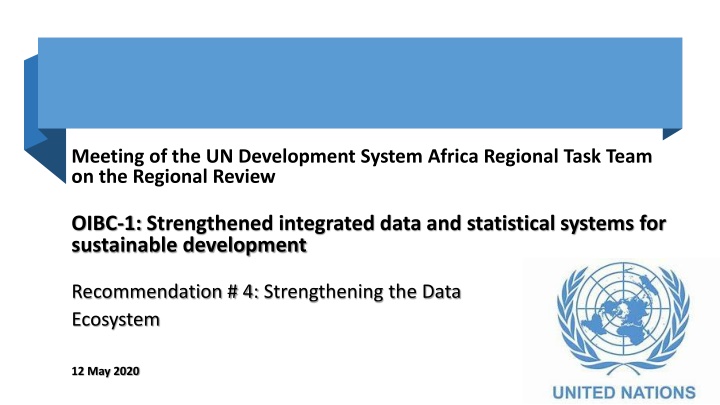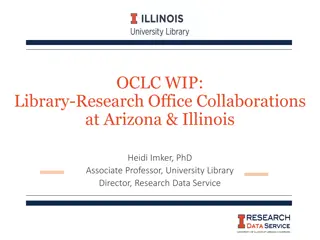
Strengthening Data Ecosystem for Sustainable Development in Africa
The UN Development System Africa Regional Task Team aims to strengthen integrated data and statistical systems for sustainable development in Africa. The recommendation focuses on launching a region-by-region change management process to consolidate existing capacities in data and statistics. The challenges, opportunities, and partnerships are identified, with an approach to develop strategies for generating and disseminating quality data for evidence-based decision-making. The vision is to create an integrated data ecosystem supporting Agenda 2030 for SDGs and Agenda 2063.
Download Presentation

Please find below an Image/Link to download the presentation.
The content on the website is provided AS IS for your information and personal use only. It may not be sold, licensed, or shared on other websites without obtaining consent from the author. If you encounter any issues during the download, it is possible that the publisher has removed the file from their server.
You are allowed to download the files provided on this website for personal or commercial use, subject to the condition that they are used lawfully. All files are the property of their respective owners.
The content on the website is provided AS IS for your information and personal use only. It may not be sold, licensed, or shared on other websites without obtaining consent from the author.
E N D
Presentation Transcript
Meeting of the UN Development System Africa Regional Task Team on the Regional Review OIBC-1: Strengthened integrated data and statistical systems for sustainable development Recommendation # 4: Strengthening the Data Ecosystem 12 May 2020
Recommendation # 4 Strengthening Data Ecosystem The SG requested a unique proposal from each region: I propose to launch a region-by-region change management process that will seek to consolidate existing capacities with regard to data and statistics, as well as other relevant analytical functions that may be currently duplicative. This exercise will have to be unique to each region and will be detailed and fleshed out in full consultation with each regional commission and respective regional team of the United Nations Sustainable Development Group. Any related changes to existing structures or budgets will be submitted to United Nations legislative committees for endorsement by Member States prior to implementation. [A/74/73 E/2019/14, para. 115]
Challenges, Opportunities and Partnerships Challenges, Opportunities and Partnerships Opportunities Current Status and challenges Lack of harmonization of data Insufficient funding and dependence on external resources Weak system for data management WEAK GOVERNANCE STRUCTURE & COORDINATION Partnerships & collaborations Underutilized role of research and development Limited uptake of new technologies Weak demand and capacity to use data
Approach. Approach . The UN Sustainable Development Group in Africa will work to develop strategies to generate and disseminate quality data and to improve the use of data for evidence-based decision-making leading to inclusive, sustainable and resilient societies in the region Data quality, accurate, relevant, timely, cost effective, disaggregated and accessible to all Driven by innovation, robustness, online and digitization, integrated and harmonized approaches to respond to SDGs, Agenda 2063 and national development frameworks Thus, imperative to design and deliver a ONE UN National Statistical Capacity Programme in all African countries to support the development of sustainable statistical system
Vision: An integrated and comprehensive data ecosystem that will support an effective implementation of Agenda 2030 for SDGs and Agenda 2063 Mission: To develop an integrated data ecosystem, that improves policy and programme delivery and effectiveness, through generation, dissemination and use of quality data to monitor progress and ensure achievement of the SDGs and Agenda 2063 Principles Harness the power of Big data and innovation technologies Promote sustainability 1 2 3 4 Coherence in statistical systems in order to generate reliable & comparable data 5 Advance rights for all & Data privacy and sovereignty Recognizes data as a public good and rights imperative
Proposed Flagship Initiatives Transforming the National Statistical Systems in Africa Promote the culture of Data Use Online Data Platform Data Gateway 1. Develop procedures for adopting innovative methodologies - NSS to Go Digital Develop a robust online data system with data at regional, country, subnational for all SDGs and Agenda 2063, that is harmonized with other data systems in Africa to continuously be accessible to provide quality data ecosystem Develop guidelines and strategies for promoting culture of data use Develop criteria for identifying the Champion on Data for Development, including clear roles; 2. Design and deliver a ONE UN National Statistical Capacity Development Programme
DATA DATA DISSEMINAITON Gateway DATA COLLECTION PROCESSING Regional and sub-regional organizations SDG tracking progress sources Other Censuses Admindata Surveys Raw data flow AUC, AFDB, RECs SDG report Processed data flow Ad-hoc data flow Data quality SDG infographics and visuals assessment Data flows Coordination Methodology Concepts Capacity building SDG data availability report Ministries aggregates Regional National Statistical System SDG data access via the web Custodian Agencies Data NSOs Harmonization UNSD Global SDG Indicators Database Processed data CentralBanks Methodology Africa s processed data Other data sources SDGC/A Data Methodologies, concepts and metadata Reports SDG INDEX SDG/A2063 Alignment Reports Country SDGs Profile Data Other custom reporting (VNR, etc.) IPRT 30% of the data of Agenda 2063 does not go through the custodian agencies SDG Progress Assessment Data
Strategies to ensure integrated data & Strategies to ensure integrated data & statistical system for sustainable development statistical system for sustainable development CAPACITY DEVELOPMENT/STRENTHENING HARMONISED DATA SYSTEMS INNOVATION & NEW TECHNOLOGIES DATA CHAMPIOIN GENERATION, ACCESS & UTILIZATION PARTNERSHIP & COLLABORATION
Leveraging Existing Data & Statistics Coordination Regional Global Level 2: UN- CCS: Committee for the Chief Statisticians of the United Nations System Level 1: Regional commissions UNSD + Regional Commissions + Regional Commissions NY Office Level 3: CCSA: Committee for the Coordination of Statistical Activities - International and supranational organizations StatCom- Africa (ECA) CoDG (AUC) ASCC (AUC, AfDB, ACBF, ECA, RECs )
Expected results & timeframe Timeframe Results 1-2 years Transforming the National Statistical System in Africa Digitized systems Digital data collection Increased use of Big Data and other non-traditional sources Defined roles and linkages at all levels; national, regional and global Establishment of new partners, enhanced collaboration and coordination ONE UN National Statistical Capacity Development Programme in place 1- 18 months Robust Data Gateway harmonized with other data systems to continuously provide quality data ecosystem 1- 12 months Promote the culture of Data Use Easy access and use of data Increased investment in data and statistics
Envisaged Resource Implications Proposed approach and changes in the regional data ecosystem will require inter alia structural changes including:- Re-deployment of staff in some cases, Recruitment of additional skills, Training of existing UN staff on new skills, and Resources for capacity strengthening, software and hardware These may have zero or minimal budgetary implications
Other areas to be considered Results Framework Theory of change Governance Modalities of operation Risk and mitigation measures Costed implementation plan SG s Data Strategy 2020-2022
Update.request to build a COVID-19 Hub Africa UN Knowledge Hub on COVID-19 that provides cutting edge resources and data on various aspects of the pandemic to the UN Agencies, member states and other partners. The hub serves as a source of updates of data as well as other resources; Presents opportunity to learn, share and collaborate among UN agencies to mitigate challenges brought about by COVID-19. An online ecosystem that takes advantage of the advanced emerging information technologies and methodologies ensuring integration and interoperability of the UNDS knowledge systems within UN and other partners. One-Stop-Shop for information and knowledge resources on the pandemic Resources requirements maintenance and update on regular basis Task Force on recommendation 2 - Knowledge Management will now manage
High-Level Architecture of Africa Knowledge Management Hub on COVID-19 Demo - https://knowledge.uneca.org/covid19/
Thank you Thank you






















